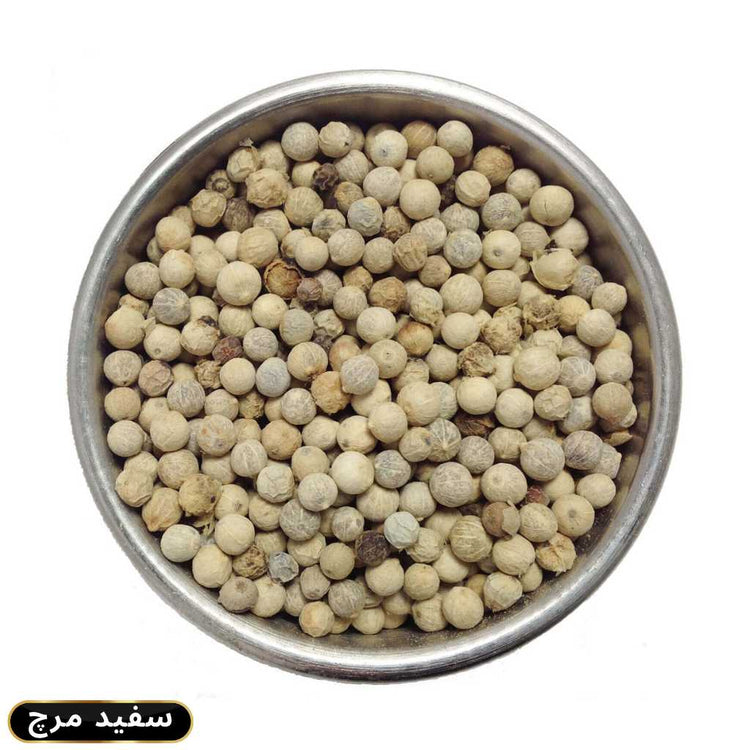
White Pepper | Safaid Mirch Sabit |100gm Packs
Availability: In Stock
SKU:
AR-000291



Free Shipping on orders above 5000 PKR!
My Experience excellent Khan Dry Fruits
Best Quality Dry fruits Khan Dry High Quality Dry fruits in Lahore i recemand...
Amazing experience Amazing Quality Amazing dry fruits Loved it.




White pepper is a popular spice that adds a unique and delicate flavor to a wide range of dishes. It is derived from the same plant as black pepper, but it undergoes a different processing method, resulting in a distinct taste and appearance. In this article, we will explore the characteristics, culinary uses, health benefits, and potential drawbacks of white pepper.
What is White Pepper?
White pepper comes from the dried berries of the Piper nigrum plant, which is native to India and other parts of Southeast Asia. The berries, known as peppercorns, are harvested when they are fully ripe and then soaked in water to remove the outer skin. The remaining seed, or core, is then dried, resulting in white pepper. This process gives white pepper a milder and less pungent flavor compared to black pepper.
Flavor Profile and Culinary Uses
White pepper has a complex flavor profile with subtle earthy and floral notes. It is known for its mild spiciness and aromatic qualities. The flavor of white pepper is more delicate than that of black pepper, making it a preferred choice in dishes where a milder heat and flavor are desired. It blends well with other spices and ingredients, allowing it to enhance the overall taste of various cuisines.
White pepper is commonly used in dishes where the appearance of black specks is undesirable. It is particularly popular in light-colored or creamy dishes such as soups, sauces, mashed potatoes, and creamy pasta dishes. It adds a gentle heat and depth of flavor without altering the visual appeal of the dish. Additionally, white pepper is used in some traditional Asian cuisines, including Chinese and Thai dishes, to provide a subtle spiciness.
Health Benefits of White Pepper
White pepper offers several potential health benefits due to its unique composition. It contains vitamins, minerals, and antioxidants that contribute to its positive effects on health. Some potential benefits include:
Digestive Health: White pepper has been traditionally used to aid digestion and promote gut health. It may help stimulate the production of digestive enzymes, improve nutrient absorption, and alleviate digestive discomfort.
Antioxidant Properties: White pepper contains antioxidants that help protect the body against oxidative stress caused by free radicals. These antioxidants may contribute to overall well-being and support the immune system.
Anti-inflammatory Effects: Some studies suggest that white pepper may possess anti-inflammatory properties, which can help reduce inflammation in the body and potentially benefit conditions such as arthritis and inflammatory bowel disease.
Respiratory Health: White pepper has a warming effect and is often used in traditional remedies for respiratory issues like colds, coughs, and congestion. Its natural properties may help relieve symptoms and promote respiratory health.
Drawbacks and Considerations
While white pepper offers several benefits, it is important to note a few considerations. Some individuals may be more sensitive to the heat and spiciness of white pepper, particularly those with gastrointestinal issues or sensitivity to spicy foods. Additionally, excessive consumption of white pepper may irritate the digestive system or cause heartburn in some individuals. It is always advisable to use white pepper in moderation and be mindful of personal sensitivities.
Incorporating White Pepper into Your Cooking
To incorporate white pepper into your cooking, it is available as whole peppercorns or ground powder. Ground white pepper is more commonly used in recipes for its ease of incorporation. It can be added during cooking or sprinkled as a finishing touch to enhance the flavor of your dishes.
When purchasing white pepper, it is recommended to select high-quality brands to ensure freshness and optimal flavor. Store it in a cool, dark place in an airtight container to preserve its quality.
Conclusion
White pepper is a delightful spice that offers a milder and more delicate flavor compared to its black pepper counterpart. It is commonly used in light-colored dishes to avoid the appearance of black specks while still adding a gentle heat and depth of flavor. Its culinary uses range from soups and sauces to creamy dishes and traditional Asian cuisines.
In addition to its culinary applications, white pepper may offer several health benefits due to its antioxidant properties, potential anti-inflammatory effects, and positive impact on digestive and respiratory health. However, it's important to use white pepper in moderation and be mindful of personal sensitivities, as excessive consumption may lead to digestive discomfort or heartburn in some individuals.
When incorporating white pepper into your cooking, opt for high-quality brands and store it properly to maintain its freshness and flavor. Whether you're looking to add a subtle spiciness to your dishes or explore its potential health benefits, white pepper is a versatile spice that can elevate your culinary creations.
Rs. 0.00
Select Weight / Size:
Please confirm your details to place your order via WhatsApp.

Khan Dry Fruits are Fresh Tasty & Best Quality to deliver all over Pakistan. Our Dry Fruits are highly selected by QC staff.
2% discount and receive coupon for first shopping

